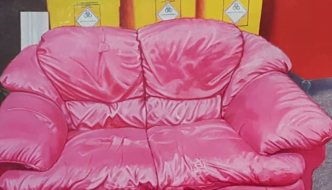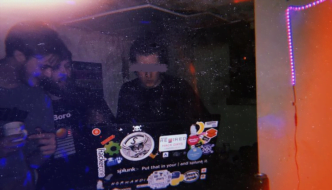Osud and Trouble In Tahiti: Opera North Double Bill at Leeds Grand Theatre

Photograph credited to Alastair Muir
Just when the collective assumption takes hold that Opera North had staged every major Janáček opera and had gained, deservedly, a highly successful reputation for its advocacy, here they emerge, having managed to discover another one, a work long overlooked.
Osud was composed in 1904, so it followed the more-famous Jenůfa chronologically. Jenůfa did not get accepted for performance in Prague until 1916 and beyond that, with his reputation established and his meeting the love of his life, Kamila Stösslová, the 1920s saw him complete his five other operatic masterpieces. Osud got left behind and was never performed in his lifetime.
One reason for its neglect at the back of everyone’s drawer lies in its length: at about 80 minutes, it falls short of an evening’s programme to itself, but is a little too long for inclusion in an equal double-billing. Another drawback is its rather confusing storyline of flashbacks and hallucinations. A composer writing an opera, without a proper ending, about a composer writing an opera without a proper ending risks being ridiculed for anal autobiographical introspection. Yet here, contained in its pages, are the essential elements of Janáček’s mature style: the layering of multiple musical ideas in the orchestration and the assimilation of Moravian speech rhythms and nuanced pitch undulations in the vocal parts.
John Graham-Hall has sung the part of Živný, the story’s composer, before in Stuttgart, and shows he has the measure of its taxingly high declamatory passages and full, understated command of the subtleties of its darker brooding. As the self-centred creative artist, he struts obsessive preoccupation very well.
For ON regular, Giselle Allen, as his storyline one-time lover, Míla, this is her fifth Janáček opera for the company. Her frustration, torment and rapture at Živný’s return to her life are all caught with conviction. Most impressively, she reserves a genuinely moving ardour for the loving tenderness of the more intimate interludes. For these, conductor Martin André has the orchestral strings play with real affection. Elsewhere, the brass are gruffly vigorous, but the night holds moments of noticeable ensemble imprecision.
Without doubt, the star performance comes from Rosalind Plowright as Míla’s mother. Her transfixed, wild-eyed opposition to the lovers’ liaison degenerates before us into a cruelly self-inflicted insanity. Fittingly, there are no long arias of reasoned cantabile argument through which she could shine, but she writhes wholly believably in Janáček’s twisted, tortured vocal writing, the evening’s most accomplished, deftly articulated and memorable delivery.
Overall, this completion of Opera North’s grand Janáček project is to be applauded, but, for reasonably-paced story-telling and cogent character development, one appreciates why, by necessity, operas routinely must be longer than Osud.
By contrast, Bernstein’s Trouble In Tahiti, is relatively problem-free.
A dysfunctional married couple, Sam and Dinah, perhaps unknowingly closer than they imagine, their seen-but-not-heard little boy, Junior, and a Greek chorus trio, providing narrative, are all the cast that Bernstein needs. This Day-In-The-Life-Of sketch of love’s slow death is simple, yet recognisably 1950s American suburbia, something we have all seen many times through a Hollywood lens.
The tunes are engagingly neat and melodious, the lyrics witty and decidedly pointed when sung. Bernstein’s jazzy orchestration captures argument with wind and percussion – drum kit to the fore – and compassion with long-breathed strings. Maestro Tobias Ringborg conducts with refreshingly focussed directness.
Dutch baritone Quirijn De Lang (Sam) has a little trouble finding prominent voice for some admittedly low writing, but a burnished high register is just right for his solo set-pieces and the duets with his wife. His is a convincingly familiar portrayal of self-aggrandising get-up-and-go: ruthlessly pitiless in business, ungenerously competitive at sport, a chauvinist at home. He fails to attend Junior’s school play because he has to play a handball final.
Wallis Giunta (Dinah) finds glorious expression in her showpiece “What A Terrible, Awful Movie”, as she leaves the afternoon cinema having watched a South Sea escapist fantasy, Trouble In Tahiti. Between shopping for a new bag and a session at the therapist’s, she too fails to make Junior’s play.
Alone, each wonders where their relationship went wrong.
The chorus trio offers minor sympathy on the couple’s suffocating domestic relationship and adds enthusiastic commentary on their aspiring lifestyle, all with the mile-wide smile of a TV advertisement jingle.
As the composer’s biographer, Humphrey Burton, has pointed out, with Trouble In Tahiti, Bernstein himself was pushing forward into emotional territory that no-one previously in American theatre had dared to explore.
Make sure you explore it yourself.
Both operas are sung in English and can be seen separately or in combination with other works in ON’s The Little Greats series.
For further information and to book your tickets, please visit the Opera North website.
Filed under: Music, Theatre & Dance
Tagged with: double bill, leeds, leeds grand theatre, opera, opera north, Osud, review, theatre, Trouble in Tahiti



Comments